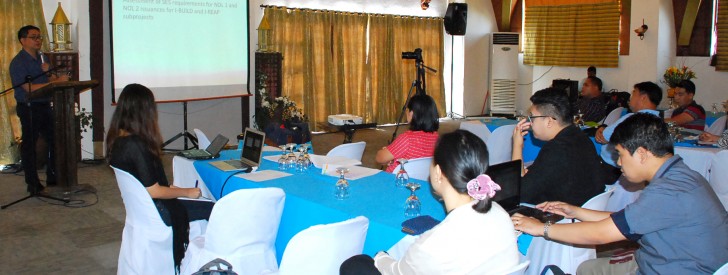 PRDP Deputy Director Arnel V. de Mesa presents overall updates on PRDP during the SES 1st Quarter Assessment Workshop on March 16-20, 2015 in Laoag, Ilocos Norte. During the meeting, de Mesa also told participants that issues on SES compliance must be addressed in the regional level right away to facilitate the implementation of the project and prevent delays. (Photo by Kathrino Resurreccion)
PRDP Deputy Director Arnel V. de Mesa presents overall updates on PRDP during the SES 1st Quarter Assessment Workshop on March 16-20, 2015 in Laoag, Ilocos Norte. During the meeting, de Mesa also told participants that issues on SES compliance must be addressed in the regional level right away to facilitate the implementation of the project and prevent delays. (Photo by Kathrino Resurreccion) DA-PRDP pushes for environmentally and socially sound projects
The Department of Agriculture (DA) will work closely with other government agencies to ensure that construction of infrastructure and various activities undertaken for different sub-projects of the Philippine Rural Development Project (PRDP) maintain social and environmental decorum.
Under the P27.5-billion PRDP, all proposed sub-projects are required to undergo environmental and social assessments as part of their feasibility studies and business plans. The assessment, which is part of the feasibility study reports should contain information about the environmental and social conditions of the sub-project site and allow the proponent to prepare the Environmental and Social Management or Mitigation Plans.
As such, the Social and Environmental Safeguards (SES) Unit of the DA-PRDP will carry on strict guidelines to ensure that project activities do not pose threats to the environment, indigenous people, and project affected persons.
“These set of rules seeks to safeguard the environment and local dwellers where sub-projects will be implemented,” PRDP National Deputy Director Arnel de Mesa announced.
As part of the requirements for approval of the sub-projects proposed under the DA-PRDP, the Local Government Units (LGUs) must secure environmental clearances and documents declaring that locals affected by the project implementation are rightfully consulted and compensated.
With this, the DA-PRDP will work closely with the Environmental Management Bureau (EMB) of the Department of Environment and Natural Resources (DENR) and the National Commission on Indigenous People (NCIP) to ensure that permits and clearances prerequisite to the implementation of sub-projects are submitted.
To further address issues on compliance of the LGUs in implementing PRDP-funded projects, the SES Unit has conducted its First Quarter Assessment Workshop and Training on the Grievance Redress Mechanism on March 16-20, 2015 in Laoag City, Ilocos Norte.
Among the issues discussed during the workshop are streamlining of the submission of documents and clearances, as well as setting up of a Grievance Redress Mechanism (GRM), where complaints and suggestions of local dwellers in project sites can be addressed accordingly.
The Kalahi-CIDSS of the Department of Social Welfare and Development (DSWD) also shared their strategies in community empowerment which is crucial in grievance redress.
PRDP National Deputy Director Arnel de Mesa told participants that issues on SES compliance must be addressed in the regional level right away to facilitate the implementation of the project and prevent delays.
“You need to be proactive in monitoring compliance of the LGUs, as well as in addressing grievances of the locals,” he urged SES staff. (Catherine Nanta, InfoACE NPCO)
